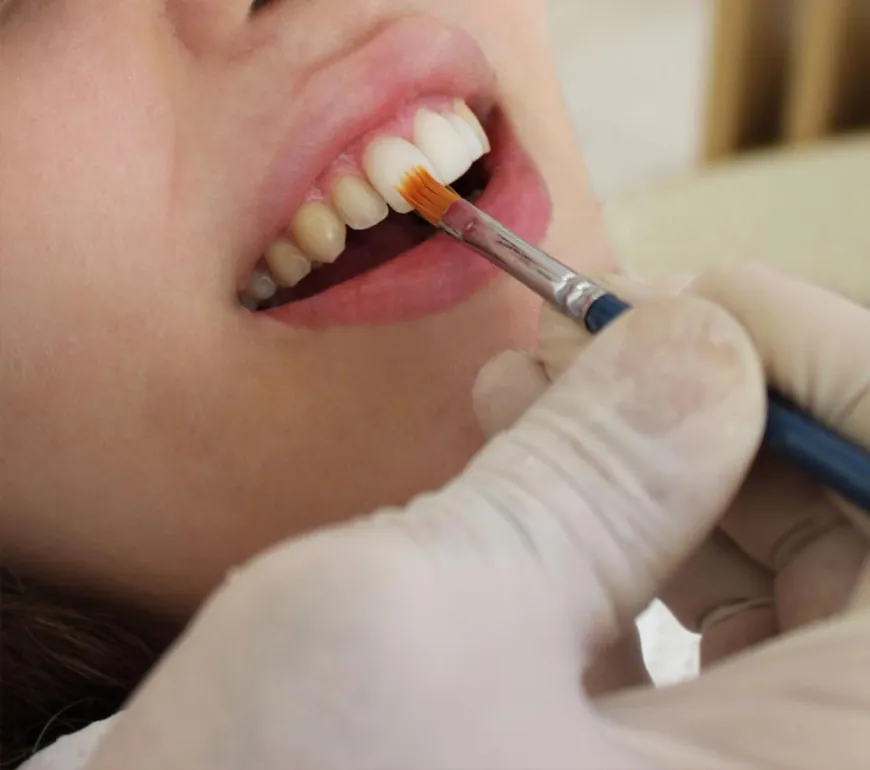Age and Teeth Whitening: What You Need to Know
Are you tired and embarrassed by yellowing teeth? Do you want to get them treated? Get teeth whitening. Learn more about Teeth Whitening in Dubai & Abu Dhabi.

Teeth whitening has become one of the most popular cosmetic dental treatments worldwide. Whether it's the desire to achieve a brighter smile or reverse the effects of stains from food, drinks, or aging, many people turn to teeth whitening solutions for a more confident appearance. However, the age factor plays a crucial role in determining these treatments' efficacy, safety, and outcome. In this article, we will explore how age affects teeth whitening and what you need to know before undergoing such procedures at different stages of life.
Understanding Teeth Discoloration:
Before diving into the impact of age on Teeth Whitening in Dubai, it’s important to understand why teeth discoloration occurs. Tooth discoloration can be categorized into two main types:
-
Extrinsic Discoloration: This type of discoloration occurs on the surface of the teeth and is primarily caused by external factors like the consumption of certain foods and drinks (coffee, tea, wine), smoking, or poor oral hygiene.
-
Intrinsic Discoloration: This discoloration happens from within the tooth. It can be caused by aging, medication use (such as tetracycline), excessive fluoride exposure, or trauma to the teeth.
Both extrinsic and intrinsic discoloration can affect the outcome of teeth whitening treatments, and age influences the type and severity of discoloration.
How Age Affects Teeth Whitening:
As we age, several changes take place in our teeth that can influence how effective and safe whitening treatments are. Here's how different age groups may experience teeth whitening:
Teeth Whitening in Young Adults (Ages 18–30)
Young adults tend to have healthier teeth with minimal staining. The enamel (the outer layer of the tooth) is usually thicker and in better condition compared to older individuals, allowing for effective whitening results. In this age group:
- Rapid Results: Teeth respond well to whitening treatments, whether it's in-office bleaching or at-home whitening kits.
- Fewer Concerns: Young adults typically do not face the same concerns about tooth sensitivity or weakened enamel that older individuals do, making the procedure generally safe and effective.
However, it is crucial to avoid over-whitening, as too much bleaching can weaken the enamel over time. A professional consultation is recommended to ensure the treatment is done safely.
Teeth Whitening in Middle-Aged Adults (Ages 30–50):
In this age range, people start noticing more pronounced teeth discoloration due to lifestyle habits like coffee consumption, wine, or smoking, as well as the natural thinning of enamel. Middle-aged adults may need more frequent whitening treatments to achieve and maintain the desired shade.
- Moderate Results: While whitening treatments are still effective, the results may not be as immediate or dramatic as they are in younger adults.
- Increased Sensitivity: As enamel wears down over time, there is an increased risk of tooth sensitivity during and after the whitening process. Dentists often recommend using whitening products with lower peroxide concentrations or desensitizing agents to mitigate discomfort.
- Professional Guidance: For middle-aged individuals, it is especially important to seek professional advice to ensure the whitening method chosen is appropriate for the condition of their teeth.
Teeth Whitening for Seniors (Ages 50+):
For individuals over 50, intrinsic tooth discoloration becomes more prominent. Teeth naturally darken with age due to changes in the structure of the enamel and dentin (the layer beneath the enamel). The dentin thickens and becomes more yellow, and as the enamel thins, the yellow hue becomes more visible.
- Limited Effectiveness: Teeth whitening treatments may not be as effective for seniors, especially if the discoloration is due to intrinsic factors related to aging. Surface-level treatments like whitening strips or gels may not penetrate deep enough to address these issues.
- Enhanced Sensitivity and Risks: Older adults are more prone to dental sensitivity and may have other oral health issues such as receding gums or enamel erosion, making aggressive whitening treatments less advisable. Customized treatments prescribed by a dentist are the safest option for seniors.
- Alternative Options: In cases where whitening treatments are less effective, older adults may consider alternatives such as dental veneers or bonding to achieve a brighter smile.
Factors to Consider Before Teeth Whitening:
Regardless of age, it’s essential to consider several factors before undergoing a teeth whitening procedure. Here are some key considerations:
Oral Health Condition:
Whitening treatments should only be performed on healthy teeth and gums. Individuals with untreated cavities, gum disease, or other oral health issues should address these problems first before considering whitening.
Type of Discoloration:
As mentioned earlier, extrinsic discoloration is easier to treat with surface-level whitening treatments. However, intrinsic discoloration caused by aging or other factors may require more advanced techniques or may not respond as effectively to traditional whitening.
Sensitivity Concerns:
Tooth sensitivity is a common side effect of whitening, particularly for older individuals with thinner enamel. It's important to choose whitening products that are designed for sensitive teeth, or to use desensitizing agents as recommended by a dentist.
Professional vs. Over-the-Counter Whitening:
While over-the-counter whitening products like strips and gels are easily accessible and affordable, they may not always be the best option, especially for older individuals or those with extensive discoloration. Professional treatments administered by a dentist are typically more effective, customizable, and safer, especially for those with oral health concerns.
The Role of Maintenance in Whitening Results:
One of the most overlooked aspects of teeth whitening is maintenance. Regardless of age, maintaining a bright smile after whitening treatments requires ongoing care. Here are some tips to prolong the effects of teeth whitening:
- Avoid Staining Foods and Drinks: Limit the consumption of foods and drinks that can stain teeth, such as coffee, tea, wine, and dark berries.
- Quit Smoking: Smoking is one of the leading causes of tooth discoloration, so quitting will benefit your overall health and help maintain your whitening results.
- Good Oral Hygiene: Brushing twice a day, flossing, and using a whitening toothpaste can help keep your teeth looking brighter for longer.
- Touch-Up Treatments: Periodic touch-up treatments, either at-home or professionally, can help maintain a white smile over time.
Conclusion:
Teeth whitening can be a safe and effective way to brighten your smile at any age, but it’s essential to consider how age-related changes to your teeth may affect the results. Younger individuals generally see faster and more dramatic improvements, while middle-aged and older adults may need to consider alternative options or customized treatments for the best outcome. Regardless of your age, consulting with a dental professional before starting any whitening regimen will help ensure that the treatment is both effective and safe for your specific needs. With proper care and guidance, a brighter smile is achievable at any stage of life.
What's Your Reaction?
 Like
0
Like
0
 Dislike
0
Dislike
0
 Love
0
Love
0
 Funny
0
Funny
0
 Angry
0
Angry
0
 Sad
0
Sad
0
 Wow
0
Wow
0





















































